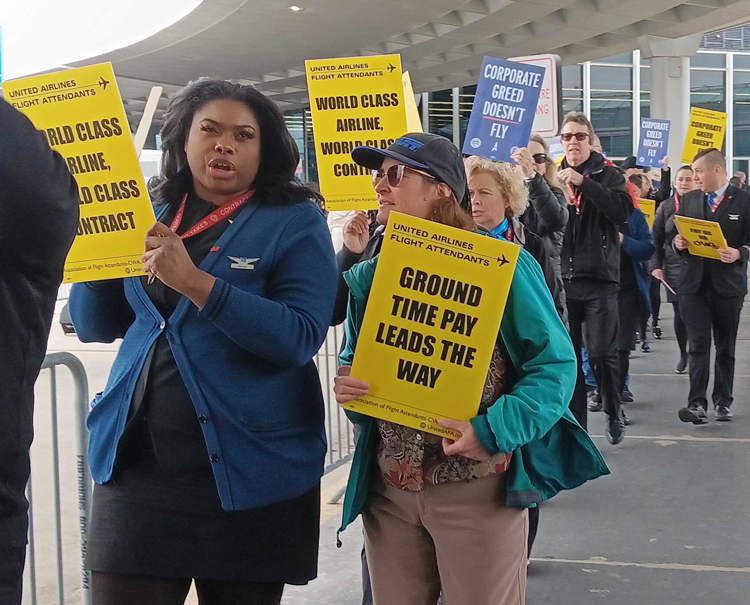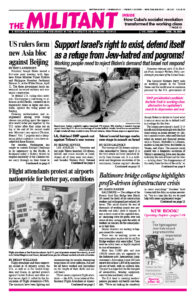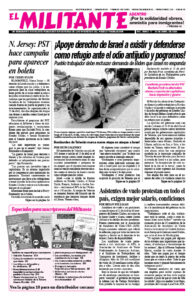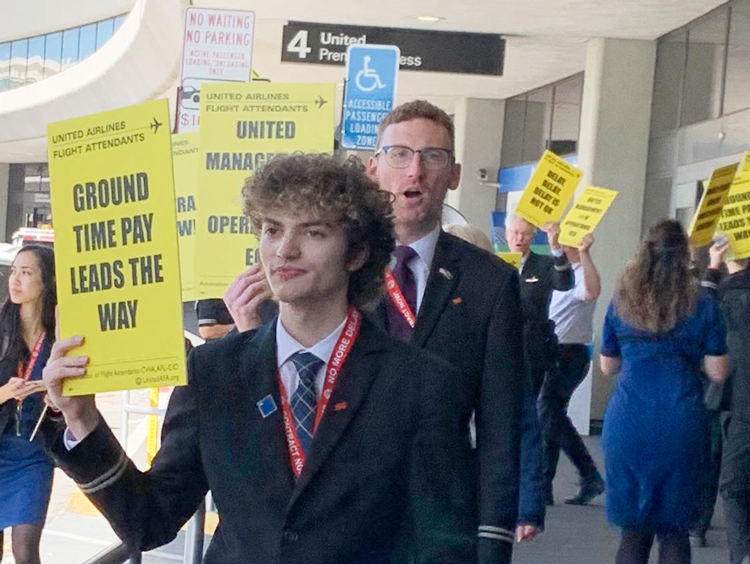Flight attendants and their supporters rallied at 16 airports across the U.S., as well as in the United Kingdom and Guam, in spirited protests against United Airlines and other airline bosses April 11 called by the Association of Flight Attendants-CWA. The unionists have been fighting and demonstrating for months demanding wage raises to cover inflation, full pay for all hours worked and limitations on the length of their shifts and on-call hours.
Three unions represent flight attendants — the AFA, Association of Professional Flight Attendants at American Airlines, and the Transport Workers Union at Southwest, JetBlue and Allegiant. They organize the more than 100,000 flight attendants across 24 airlines who have been fighting for new contracts for over two years. According to the AFA, thousands took part in the actions overall.
Using the excuse that airline workers’ labor is “essential” transportation, the government imposes the notorious anti-labor Railway Labor Act on them. This bars most strikes and entails endless delays from government interference in negotiations.
“We work all day, we work all night, side by side we’re ready to fight!” chanted a spirited group of 25 Association of Flight Attendants members outside the United Airlines terminal at Dulles International Airport, which serves the Washington, D.C., area. “Some of the most important work we do, the boarding and unloading of planes, we don’t even get paid for,” Stephanie Martin, a flight attendant for 14 years, told the Militant. “We’re only paid for the time from when the plane door closes to when it opens. Everything before and after that we’re basically working for free.”
Chip Lowe, a flight attendant for seven years, described the onerous schedules many workers face. “When we signed the last contract most shifts were in the eight-hour range, but in extreme circumstances longer shifts were allowed,” he said. “Now the company has taken advantage of this and imposed many shifts of 13 or even 16 hours. That can mean three onboardings and three deplanes in one shift and then having to drive home in rush hour.”
Lowe pointed to some of the dangerous conditions flight attendants have worked in, including when the panel-size door plug tore off a Boeing-built Alaska Airlines plane in flight and a United plane rolled off the runway in Houston. “We’re responsible for dealing with evacuations and medical emergencies on planes,” he said, “and the length of shifts just isn’t safe. It’s a public safety issue.”
Some 100 unionists picketed at Chicago O’Hare International Airport, mostly United Airlines flight attendants, plus a few pilots and flight attendants from other airlines. Sara Nelson, the international president of the AFA, joined the picket line there. Signs carried by the unionists included “Ground time pay leads the way” and “Corporate greed doesn’t fly.”
Haven’t received raise in years
United saw record profits in 2023 and all the company’s top executives received double-digit pay raises, Nelson told the pickets. The last time the association negotiated a contract with the airline was in 2016. The last time flight attendants at United received a pay raise was 2020.
“We have flight attendants who are eligible for food stamps because they haven’t seen any raises even though the cost of living has gone up,” Scott Pejas, AFA Local Council 8 president, told the media.
One picket brought a dog that wore a jacket saying, “We will NOT roll over!”

“We’re out here picketing today because United Airlines refuses to negotiate with us. It’s about respect,” Loren Darkes, a flight attendant for 39 years, told the Militant at the Cleveland Hopkins International Airport protest.
“Prices for everything have gone up through the roof since 2020, the last time we got a raise, but not our wages,” Melinda Beal, president of AFA Local Council 63, said. She also said United wants to increase the time flight attendants must make themselves available on call from 15 to 18 hours.
Flight attendant Rocky Harris said he had to be at the airport available to work recently when there was a five-hour delay. “I don’t get paid for those five hours.”
“The hardest part of our job is boarding, and we don’t get paid for it,” Darkes added.
William Nix, a retired member and former president of Amalgamated Transit Workers Local 268, joined the protest to bring solidarity. “When workers anywhere are hit we all are hit, that’s what solidarity means,” he told John Hawkins, Socialist Workers Party candidate for U.S. Senate from Ohio, who joined the action.
“Workers have power,” Nix said. “We could shut the world down if we are united.” He got a copy of Teamster Rebellion to learn more about the history of the labor and socialist movements. Two flight attendants bought introductory subscriptions to the Militant. Others said they had subscribed at similar protests at the airport in February.
Chanting “Contract now! Whatever it takes!” over 100 United Airlines flight attendants and supporters marched and rallied at San Francisco International Airport, pointing to the long-stalled negotiations between the union and company. They were joined by United workers at the airport who are members of the International Association of Machinists union and the Teamsters, as well as area members of UNITE HERE Local 2; Bakery, Confectionery, Tobacco Workers and Grain Millers union; and the San Mateo County Labor Council.
“I came out to support my fellow union brothers and sisters because they’re abused by management,” Roberto Mendes, 73, a member of Machinists Local 1781 who has worked on the ramp at United for 37 years, told the Militant.
When Kristie Rivera, president of AFA Local Council 11, told protesters, “Some new flight attendants can’t afford rent!” the crowd responded with chants of “When we fight, we win!”
Other airports where flight attendants held pickets that day included New York, Los Angeles, Boston, Denver, Houston, Phoenix and Honolulu.
As negotiations drag on, flight attendants have voted by over 98% to authorize a strike at Alaska Airlines, American and Southwest. And more protests are in the works.
Carole Lesnick in San Francisco and Betsy Farley in Cleveland contributed to this article.


